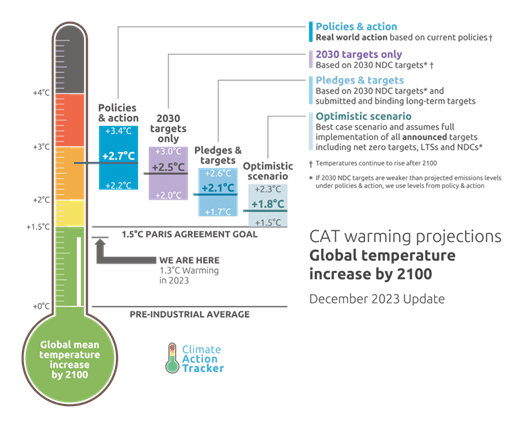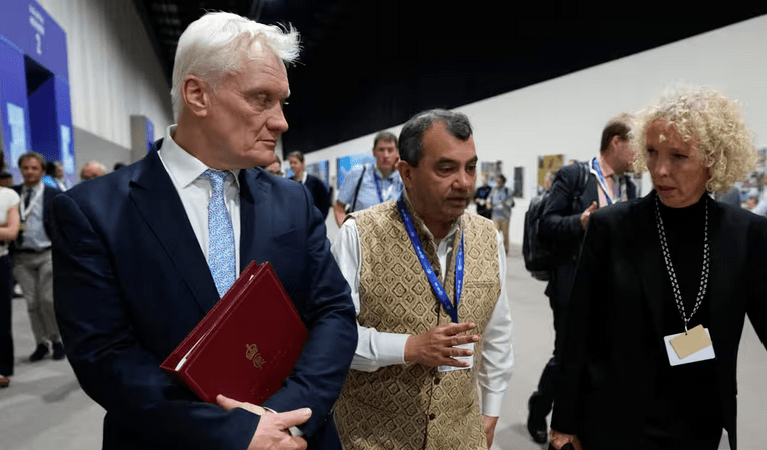As the gavel falls on the final deal from COP28 and Sultan Al Jaber, President of the COP28 climate summit, hailing it as a landmark success. East Cambs CAN chair Dr Jethro Gauld summarises what the final deal means for those of us not in the negotiating room.
The Good
The first positive outcome from COP28 was agreed early on in the conference, that was to setup a Loss and Damage fund to help the most vulnerable countries recoup losses and damages resulting from the impacts of climate change. For example, loss of land due to sea level rise. So now the fund exists but the conference finished before any significant sums of money were committed to it.
The bilateral agreement between the United States and China announced ahead of COP 28 appears to have had a positive impact with nations pledging to “Triple Renewable Energy” and “Double Energy Efficiency” by 2030. This is significant and clearly indicates the direction of travel for the world’s energy system.
On fossil fuels, what was really needed was a commitment to “phase out” fossil fuels, the burning of which is the main driver of the climate waring and resultant impacts on human health and wellbeing that we are witnessing. However, on Monday is almost looked as if any mention of fossil fuel phase out or similar language had been wiped clean from the text due to the strong influence of oil producing nations at the conference. Fortunately, in the final text a commitment to “Phase Down” coal has survived from COP26 which was held in Glasgow and for the first time in the 28 year history of the UNFCCC process nations agreed to a final text which ‘calls on parties’ to contribute to ‘Transitioning away from fossil fuels in energy systems, in a just, orderly and equitable manner, accelerating action in this critical decade, so as to achieve net zero by 2050 in keeping with the science’.
The final text also included commitments on ‘Phasing out inefficient fossil fuel subsidies’ and ‘reducing non-carbon-dioxide emissions’ such as methane and recognised the importance of nature, in particular forests, in limiting climate change.
With the commitments on renewable energy and the need to wean the world’s economy off of fossil fuels, although the language in the text isn’t as strong as many had hoped for It is also somewhat unexpected that a climate conference held in an oil producing nation would come out explicitly saying that the writing is on the wall for the fossil fuel industry.

The Bad
The lack of strong language around fossil fuels and the limited amount of increased ambition on countries’ ‘nationally determined contributions’ (NDCs) which detail how they plan to reduce their emissions over the next few years up to 2050 mean that the goal of limiting warming to 1.5°C above pre-industrial levels is effectively dead. 1.5 is no longer alive and hopes for keeping warming to well below 2°C are on life support….
The actions the text ‘calls on parties’ to contribute to is also more of a shopping list of potential actions to possibly, maybe do something rather than a set of clear policies responding to the urgency of the situation we find ourselves in. In part the blame for this falls with the wealthier nations who in 2009 committed to a target of raising $100bn a year of climate finance to help poorer nations invest in clean technologies rather than fossil fuels as they developed and help them adapt to the impacts of climate change such as more extreme heatwaves or storms. This fund was meant to be operational by 2020 however it still hasn’t reached the $100bn per year sum. This may sound like a lot but for context, the global market for Men’s grooming products in 2022 was $202.6bn.

The Ugly
Despite the backlash against the blatant efforts by OPEC (Organization of the Petroleum Exporting Countries) nations who had attempted to erase any mention of fossil fuels from the final commitments, they did succeed in sneaking in mention of “transitional fuels” into the final text which some view as a license to continue exploring for and investing in Natural Gas rather than renewables, nuclear or other low carbon energy sources.
The other really ugly outcome of COP28 is how the UK has clearly abandoned it’s position as a climate leader. Over the years, the UK had developed an influential position in these negotiations consistently pushing for higher ambition and backing this up with the presence of Prime ministers and other senior ministers. However COP28 was very different, overshadowed by recent domestic rowing back on climate policies such as the approval of new Oil, Gas and Coal extraction projects, the UK Govt appeared not to be prioritising the international climate talks as much as they should. PM Rishi Sunak spent more time on his private jet travelling to and from Dubai than he did at the conference, UK secretary of state for the Department of Energy and Net Zero Claire Coutinho only spent four days at the conference leaving Graham Stuart, Minister for Climate in charge of the UK delegation. Only for him to be recalled during the critical final stages of the negotiations to vote in support of the government on the controversial Rwanda Bill. This is a clear signal that our current government prioritise short term domestic politicking over negotiations which have consequences for every human being alive today.
If met, the policy commitments from COP28 set the world on a path to somewhere in the region of 2.8°C of warming by the end of this century. Now while this is progress on the 5°C of warming we had been heading for we need to keep pushing to go further and faster if we are to limit warming to well below 2°C. This is vital because every fraction of a degree of warming means millions more people being negatively impacted by the effects of climate change and at 1.3°C of warming we’re already witnessing low laying island states such as Tuvalu disappear below the waves. Warming of 2.8°C would mean no more coral reefs, regular extreme weather events and disruption to food supplies, the displacement of hundreds of millions or people and the likely loss of the Amazon rainforest. This is an ugly future which I hope we manage to avoid.

So What Happens Now?
The next UNFCC climate conference will be a year from now in Azerbaijan. The process is not perfect but it is the only one we have to allow all 195 of the world’s nations to come together and decide how we are to collectively respond to climate change. It can seem glacially slow in that context however the agreements do have an impact. The agreement from COP28 was arguably the first to explicitly state that the writing is on the wall for the fossil fuel industry and how the world’s major economies are moving quickly to renewables. It is vital that over the next year, countries ramp up the ambition in their NDCs and collectively act to reduce emissions of warming gases.
What can I do?
COP28 may seem far away and that there’s a limit to how much individuals can influence the UN process but now that the conference is over it is vital that people in the UK write to their representatives and join protests to make their frustrations known with regard to UK’s domestic policy on climate and how we handled our role at COP28. We can also all act to make a difference in our communities and organisations like friends of the Earth have toolkits for setting up local climate action groups. This can range from bigger practical actions like setting up a community energy project to lobbying local councillors and council officer to make changes. Most importantly, talk about climate and environment with your friends and family. You’ll probably find that they also have concerns and this is one of the most powerful things we can do to increase support for action.
Here are some ideas: https://eastcambscan.org/projects/
For further info on what happened at COP28 we’d really recommend visiting the Carbon Brief website who have produced lots of easy to digest summaries of the talks and what was committed to: https://www.carbonbrief.org/cop28-key-outcomes-agreed-at-the-un-climate-talks-in-dubai/
